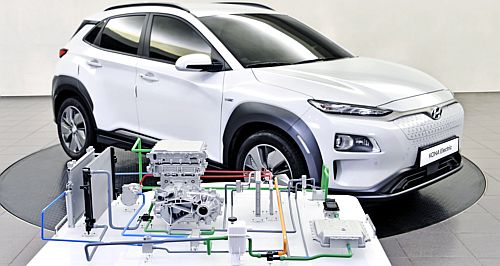Make / Model Search
News - General NewsElectrification is making air-con essentialSeminars to highlight critical role of HVAC tech in EV thermal management systems24 Jul 2023 AIR-CONDITIONING technology is so critical to the performance and energy efficiency of electrified vehicles that chemical manufacturers are lining up to have their refrigerants approved for automotive use.
This is one of the key messages of the ‘future:gas’ educational seminar series that begins in New Zealand this week and will tour Australia from August 1.
Also covered will be a generational shift taking place in the gases used across all forms of air-conditioning and refrigeration worldwide due to the phase-out of ubiquitous products like R134a that are thousands of times more potent than carbon dioxide in their contribution to climate change if released to the atmosphere.
Brett Meads, an automotive air-conditioning expert who will speak at a number of future:gas events, said the adoption of air-conditioning technology for the thermal management of electrified vehicle batteries and drivelines has elevated refrigerants from the role of creature comfort enabler to the arbiter of reaching a destination or being stranded.
“In a petrol or diesel vehicle, if the air-con fails you can at least open the window and keep driving,” said Mr Meads.
“However, many electric vehicle platforms rely on complex air-con architecture to assist in the thermal management of EV sub-systems. Should an air-conditioning fault occur it may result in the vehicle entering limp-home mode at best, or shut down altogether at worst.”
This aspect of the seminar content is proving highly topical as data from United States analytics firm Recurrent revealed that recent heatwaves reduced the battery range of some electric vehicles by up to 31 per cent when temperatures exceeded 37ºC.
University of Michigan Battery Lab technical director Greg Less told US publication Automotive News that while heatwaves are unlikely to cause long-term damage to batteries, high demands on their thermal management systems will reduce driving range.
"You're running the fan harder, you're running the refrigerant faster … All of these things take more electricity. So that's going to reduce the range," he said.
Mr Meads, who is president of Australasian automotive electrical and thermal management industry body VASA, explained that the Society of Automotive Engineers (SAE) is now evaluating several new refrigerants to find those most suited to the challenge of keeping vehicle occupants comfortable in a range of climatic conditions while managing thermal management requirements of various critical driveline components.
“The automotive industry has already encountered the problem of refrigerants that work great in Alaska being useless in Alabama, or vice-versa,” he said.
“Not only does a refrigerant need to work in any climate zone, in air-conditioning or heat pump mode, without draining too much battery range in the process, it must meet tough environmental requirements in terms of how much damage it might do to the atmosphere if it leaks out of the vehicle.”
Mr Meads said the future:gas seminars are intended to inform as many people as possible in the local automotive industry about the technological, environmental and regulatory changes affecting refrigerants so that they have the knowledge of how to begin preparing.
“As we have seen so far this year, with hybrids being outsold by purely electric cars in Australia and a big used electrified vehicle import market emerging in New Zealand combined with the robust tailpipe emissions rules over there, it will not be long before workshops – main dealer or independent – encounter a new refrigerant or sophisticated thermal management system that relies on the air-conditioning to be in perfect working order,” he explained.
“This is why we have raised a lot of industry and corporate support to subsidise the ticket prices to just $20, and made sure every attendee is fed and watered during the events, which take place on weekday evenings so as many people as possible can come along straight after work.”
According to Mr Meads, the potential environmental footprint of automotive refrigerants is a priority due to the fact air-conditioning components are often damaged in collisions.
He added that there were also concerns about how much refrigerant is released when a vehicle reaches the end of its life rather than being recovered for safe destruction or reuse.
“This is why I’m more than a bit mortified about how long it is taking global car manufacturers to send cars to Australia with the new R1234yf refrigerant,” said Mr Meads.
“Instead of the equivalent to 1.4 tonnes of CO2 if released, which is what happens with just a kilogram of R134a, the same amount of R1234yf is equivalent to a few hundred grams of CO2 if it gets out.
“The European Union banned all new cars from using R134a at the beginning of 2017, yet when I open the bonnet of a brand-new European-made car at an Australian dealership, there is still a high chance that I will find R134a in its air-conditioning system – and that includes electric cars supposedly sold on their environmental credentials.”
New Zealand future:gas seminars take place from July 25-27 and Australian seminars run between August 1 and September 6. Location information and tickets are available at https://futuregas.ac/automotive/  |
Click to shareGeneral News articlesResearch General News Motor industry news |









Facebook Twitter Instagram